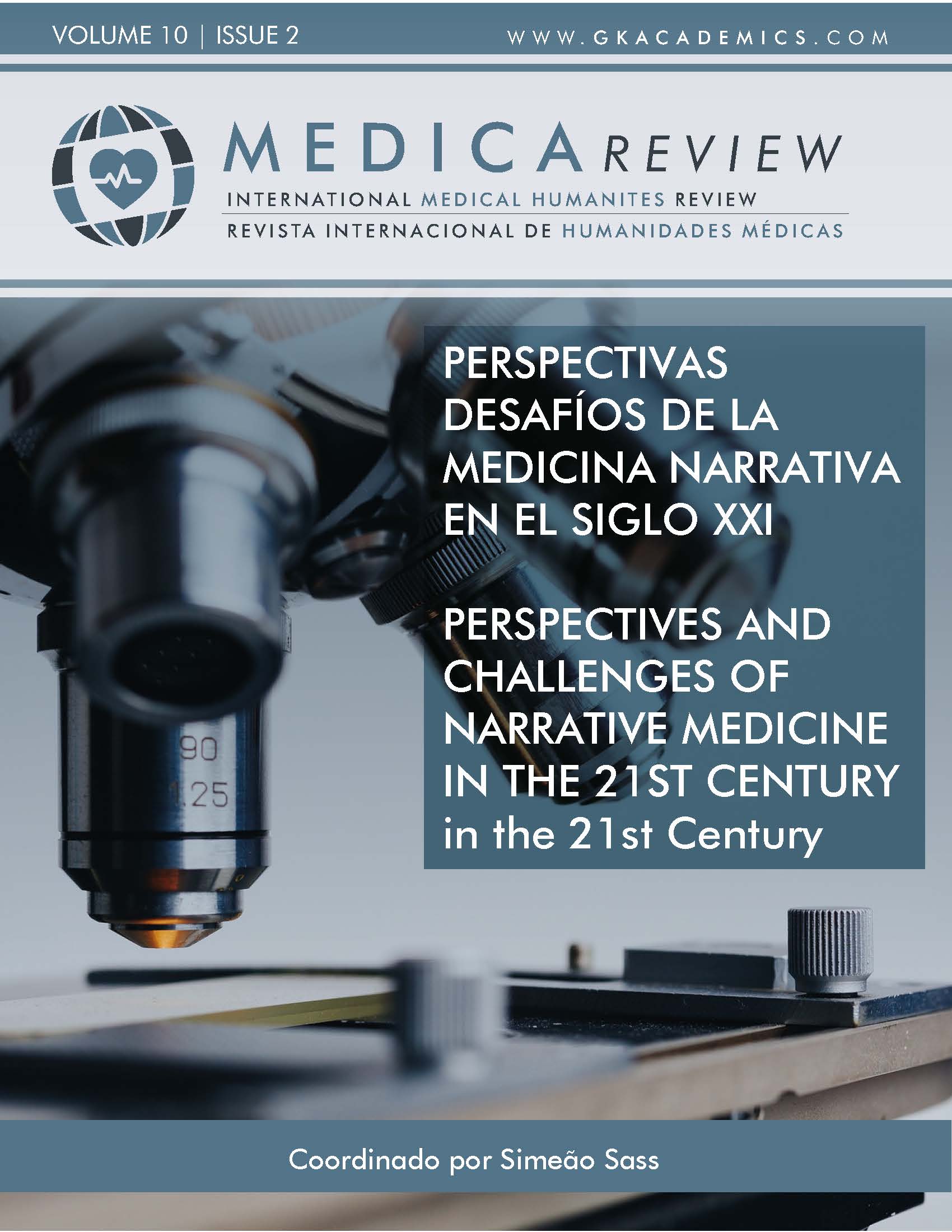Medicina Narrativa: Princípios, Benefícios e Desafios
DOI:
https://doi.org/10.37467/revmedica.v10.3281Palabras clave:
Narrativa, Medicina Narrativa, Narratividade, Humanidades Médicas, Humanidades em Saúde, Empatia , Medicina centrada na pessoaResumen
As narrativas constituem parte fundamental das experiências humanas e revelam valores, significados e propósitos. A medicina narrativa nasceu da necessidade de reagir à radicalização do modelo biomédico, que promoveu grandes avanços da saúde, mas, ao mesmo tempo, afastou a subjetividade da relação médico-paciente. A competência narrativa pode ser definida como a capacidade de ouvir, absorver, interpretar e tomar decisões baseadas nas histórias contadas pelos pacientes, e essa competência envolve habilidades textuais, criativas e afetivas quando escutando ou lendo histórias. O objetivo deste artigo é apresentar a história, os princípios, a prática e os desafios da medicina narrativa.
Citas
Ahlzén, R. (2019). Narrativity and medicine: some critical reflections. Philosophy, Ethics, and Humanities in Medicine, 14(9), 1-10. https://doi.org/10.1186/s13010-019-0078-3 DOI: https://doi.org/10.1186/s13010-019-0078-3
Andersen, F.A., Johansen, A.S.B., Soondergaard, J., Andersen, C.M., & Hvidt, E.A. (2020). Revisiting the trajectory of medical student’s empathy, and impact of gender, specialty, and nationality: a systematic review. BMC Medical Education, 20(52), 1-18. https://bit.ly/3Tr8sYU DOI: https://doi.org/10.1186/s12909-020-1964-5
Arntfield, S. L., Slesar, C., Dickson J., & Charon R. (2013). Narrative medicine as a means of training medical students toward residency competencies. Patient, Education and Counseling, 91(3), 280–286. https://doi:10.1016/j.pec.2013.01.014. DOI: https://doi.org/10.1016/j.pec.2013.01.014
Casapulla, S., L., Bianco, J., A., Harter, L., M., Kropf, K., Shaub, T. L., Kerr. A., M., Blais, F., X., Newburn,R., Nandyal, S., Ofei-Tenkorang, N., A., Biechler, M., & Baker, B. (2020). Moving toward Narrative Competence and Inclusive Healthcare through the Open Book Project. HEALTH COMMUNICATION, 35(2), 257–261. https://doi.org/10.1080/10410236.2018.1551302 DOI: https://doi.org/10.1080/10410236.2018.1551302
Charon, R. (2001). A model for empathy, reflection, profession, and trust. JAMA. 286(15), 1897– 1902. http://dx.doi.org/10.1001/jama.286.15.1897 DOI: https://doi.org/10.1001/jama.286.15.1897
Charon, R. (2004). Narrative and medicine. The New England Journal of Medicine, 350, 862–4. https://www.nejm.org/doi/full/10.1056/NEJMp038249 DOI: https://doi.org/10.1056/NEJMp038249
Charon, R. (2006). Narrative Medicine: Honoring the stories of Illness. Oxford University Press.
Charon, R., Das Gupta, S., Hermann, N., Irvine, C., Marcus, E. R., Colón, E. R., Spencer, D., & Spiegel, M. (2017) The Principles and Practice of Narrative Medicine. Oxford University Press. DOI: https://doi.org/10.1093/med/9780199360192.001.0001
Conway, K. (2007). Beyond words: illness and the limits of expression. University of Michigan Press.
Chretien, K.C., Swenson, R., Yoon, B., Julian, R., Keenan, J., Croffot, J., & Kheirbek, R. (2015). Tell me your story: a pilot narrative medicine curriculum during medicine clerkship. Journal of General Internal Medicine, 30(7), 1025–1028. https://10.1007/s11606-015-3211-z DOI: https://doi.org/10.1007/s11606-015-3211-z
De Benedetto, M.A.C, & Gallian D.M.C. (2018). The narratives of medicine and nursing students: the concealed curriculum and the dehumanization of health care. Interface (Botucatu), 22(67), 1197-207. https://doi.org/10.1590/1807-57622017.0218 DOI: https://doi.org/10.1590/1807-57622017.0218
Fioretti, C., Mazzocco, K., Riva, S., Oliveri, S., Masiero, M., & Pravettoni, G. (2016). Research Studies on patients’ illness experience the narrative medicine approach: a systematic review. BMJ Open, 6(e011220). https://bmjopen.bmj.com/content/6/7/e011220 DOI: https://doi.org/10.1136/bmjopen-2016-011220
Frank, A. W. (2013). The wounded storyteller- Body, Illness and Ethics. The University of Chicago Press.
Greenhalgh, T., & Hurwitz, B. (1998). Narrative Based Medicine – Dialogue and discourse in clinical practice. BMJ Books.
Horton, M.E.K. (2019). The Orphan Child: humanities in modern medical education. Philosophy, Ethics, and Humanities in Medicine, 14(1), 1-6. https://doi.org/10.1186/s13010-018-0067-y DOI: https://doi.org/10.1186/s13010-018-0067-y
Junior R.M., Sass S.D., & Gallian D.M.C. (2021). A ressignificação da deficiência pela literatura: os impactos do Laboratório de Humanidades em mães de pessoas com deficiência. Interface (Botucatu), 25(e200106), 1-17. https://doi.org/10.1590/interface.200106 DOI: https://doi.org/10.1590/interface.200106
Launer, J. (2018). Narrative-Based Practice in Health and Social Care – Conversations Inviting Changes (Second Edition). Routledge. DOI: https://doi.org/10.4324/9781315231129
Miller, E., Balmer, D., Hermann, N., Graham, G., & Charon, R. (2014). Sounding Narrative Medicine: Studying Student´s Professional Identity Development at Columbia University College of Physicians and Surgeons. Academic Medicine, 89(2), 335–342. https://bit.ly/3Kr1UFR DOI: https://doi.org/10.1097/ACM.0000000000000098
Milota, M. M., van Thiel, G. J. M. W., & van Delden, J. J. M. (2019). Narrative medicine as a medical education tool: A systematic review. Medical Teacher, 41(7), 802-810. https://bit.ly/3AmT4Eo DOI: https://doi.org/10.1080/0142159X.2019.1584274
Moller, J.E., & Brogger, M.N., (2019). How do residents perceive and narrate stories about communication challenges in patient encounters? A narrative study. BMJ Open, 9(e029022), 1-8. http://dx.doi.org/10.1136/bmjopen-2019-029022 DOI: https://doi.org/10.1136/bmjopen-2019-029022
Pino, AR. (2020). Narrative Medicine in Medical Diagnosis. Med (Cali).; 51(1). https://doi.org/10.25100/cm.v51i1.4339 DOI: https://doi.org/10.25100/cm.v51i1.4339
Remein, C.D.F., Childs, E., Pasco, J.C., Trinquart, L., Flynn, D. B., Wingerter, S. L., Bhasin, R. M., Demers, L.B., & Benjamin, E.J. (2020). Content and outcomes of narrative medicine programs: a systematic review of the literature through 2019. BMJ Open, 10(e031568), 1-15. http://dx.doi.org/10.1136/bmjopen-2019-031568 DOI: https://doi.org/10.1136/bmjopen-2019-031568
Shapiro, J. (2008). Walking a mile in their patients' shoes: empathy and othering in medical students' education. Philosophy, Ethics and Humanities in Medicine, 3(10), 1-11. https://bit.ly/3Ku9Q9p DOI: https://doi.org/10.1186/1747-5341-3-10
Tsevat, R. K., Sinha, A. A., Gutierrez, K. J., & DasGupta, S. (2015). Bringing Home the Health Humanities: Narrative Humility, Structural Competency, and Engaged Pedagogy. Academic Medicine, 90(11), 1462-1465. DOI: https://doi.org/10.1097/ACM.0000000000000743
Zaharias, G. (ABR 2018). Learning narrative medicine-based skills – Narrative-based medicine and the general practiceconsultation: Narrative-based medicine 2. Canadian Family Physician | Le Médecin de famille canadien, 64(4), 286-90.
Zaharias, G. (MAI 2018). Learning narrative medicine-based skills – Narrative-based medicine 3. Canadian Family Physician | Le Médecin de famille canadien, 64(5), 352-356. https://pubmed.ncbi.nlm.nih.gov/29760254/
Descargas
Publicado
Cómo citar
Número
Sección
Licencia
Aquellos autores/as que publiquen en esta revista, aceptan los términos siguientes:
- Los autores/as conservarán los derechos morales sobre la obra y cederán a la revista los derechos comerciales.
- Transcurrido un año desde su publicación, la versión del editor pasará a estar en acceso abierto en la web de la editorial, pero la revista mantendrá el copyright de la obra.
- En el caso de que los autores deseen asignar una licencia abierta Creative Commons (CC), podrán solicitarla escribiendo a publishing@eagora.org









